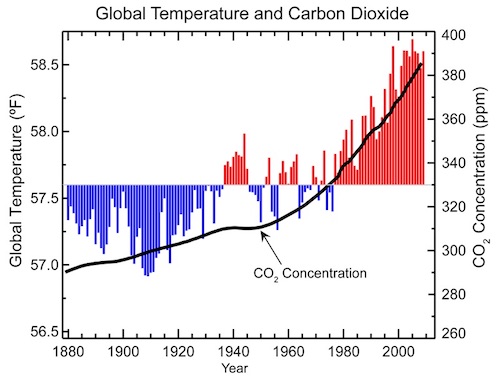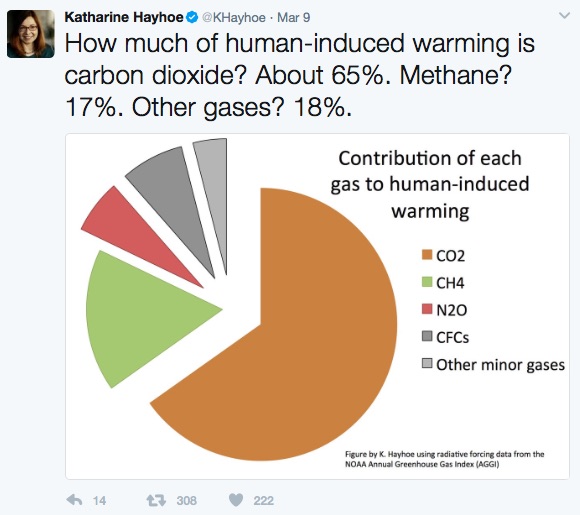
Source: National Centers for Environmental Information of the National Oceanic and Atmospheric Administration
By Bill Dawson
Texas Climate News
No one can say that Scott Pruitt – the former Oklahoma attorney general, arch-critic of the U.S. Environmental Protection Agency and now the administrator of that very agency – is not a bold man.
On Thursday, Pruitt flatly denied the consensus view of the vast majority of the world’s scientific community, declaring in an interview with CNBC at an energy industry conference in Houston that he does not think that carbon dioxide is “a primary contributor to the global warming that we see.”
In a strengthening scientific consensus that has steadily coalesced over the last few decades, the world’s scientists have concluded just the opposite – that carbon dioxide, or CO2, which is emitted whenever fossil fuels (coal, oil and natural gas) are burned, is, in fact, the principal human-produced greenhouse gas that is warming the earth’s atmosphere and dangerously disrupting its climate.
The scientific consensus is so broad and so strong that many who oppose actions to reduce greenhouse emissions have refrained in recent years from challenging the basic science – CO2 emissions are heating up the atmosphere – and instead argued that pollution-driven climate change might not turn out to be all that bad or that phasing out fossil-fuel use would be too expensive.
In his Houston interview, however, Pruitt, long a climate-action opponent in his Oklahoma position and now head of the agency where former President Obama’s regulatory attack on greenhouse pollution is centered, signaled that the Trump administration may be preparing a frontal attack on the bedrock conclusions of climate scientists themselves, not just the emission-cutting strategies that flowed from them under Obama.
It would be a legally challenging project for the administration, to put it mildly. The Supreme Court ruled in 2007, during the George W. Bush administration, that the EPA was not just empowered but obligated by scientific findings of that time to regulate greenhouse gases as pollutants. In line with the court ruling, the EPA under Obama in 2009 issued an “endangerment finding” finding that stated there was “compelling” basis in the scientific literature on climate change to do that.
Michael Gerrard, director of the Sabin Center for Climate Change Law at Columbia University, told Pro Publica last November that for the Trump administration to try to “overturn the endangerment finding would be like running toward a machine gun. Scientific support was very strong when it was issued in 2009; it has become much stronger since then.”
If Pruitt’s Houston comment is a hint that Trump appointees might be considering an effort to junk the endangerment finding, it would undoubtedly draw vigorous legal opposition from various states and environmental groups that have vowed to defend Obama-era climate regulations.
It would also, as Gerrard said, mean the administration was adopting an extremely lonely scientific stance. Here are some of the entities and individuals that Pruitt was, in essence, disagreeing with – that accept the scientific consensus that carbon pollution from fossil-fuel use is propelling global warming:
The Intergovernmental Panel on Climate Change, which comprises hundreds of scientists from different nations and is the world’s leading scientific body on the subject, declared in its last major synthesis of climate research in 2013 that it is “extremely likely that human influence [mainly CO2 pollution] has been the dominant cause of the observed warming since the mid-20th century.” In IPCC terminology, “extremely likely” means 95 percent certain, or about as sure as medical science is that smoking causes cancer.
A number of studies surveying peer-reviewed and published research studies by climate scientists have found that “97 percent or more” of those scientists concur with the IPCC’s “extremely likely” conclusion.
American scientific societies endorsing the basic CO2-warming link include the American Academy for the Advancement of Science, American Chemical Society, American Geophysical Union, American Medical Association and American Meteorological Society. The U.S. National Academy of Sciences is also in agreement, and at least 198 scientific bodies around the world endorse the conclusion that human activities are causing global warming.

Posting this chart on Twitter on Thursday, Katharine Hayhoe, director of the Climate Science Center at Texas Tech University, was one of many climate scientists responding to news that EPA chief Scott Pruitt denied the validity of their work.
Inspired by the strength and breadth of world scientific accord that human-emitted CO2 is the major force behind manmade climate change, 195 nations reached a historic agreement in Paris in December 2015 to try to avoid the most devastating effects of that disruption. All the nations agreed to voluntarily reduce their own carbon dioxide emissions. (Although President Trump pledged in his campaign to withdraw from the Paris pact, Politico reported Thursday that some administration officials are arguing that the U.S. should stay in the agreement, though with a smaller emission-cutting pledge. Pruitt appears to be on the other side of an administration tussle on the question – he told CNBC the Paris Agreement is “a bad deal.”)
Pruitt’s denial of the scientific consensus on carbon dioxide may endear him to some fossil-fuel companies that see CO2-reducing measures as a threat, but those firms don’t include oil-and-gas giants ExxonMobil, Shell and BP. All have basically endorsed mainstream science on the climate-change question and spoken in favor of carbon-reducing measures.
Exxon, for instance: “The risk of climate change is clear and the risk warrants action. Increasing carbon emissions in the atmosphere are having a warming effect.” And Shell: “…[I]n order to prosper while tackling climate change, society needs to provide much more energy for a growing global population while finding ways to emit much less CO2.”
The state climatologists in fossil-fuel-dependent Texas and next-door Oklahoma (Pruitt’s home until recently) – both scientists with officially state-recognized expertise in climate science – are members of the scientific consensus on CO2’s role in causing global warming.
Texas state climatologist John Nielsen-Gammon of Texas A&M University told Texas Climate News in 2012 that he is an explainer and defender of the mainstream scientific view that humanity “has been the primary influence [on climate] over the past half-century or so and that at the present rate we’re going to continue producing a warmer climate on the order of several degrees over the next century.”
Similarly, the Oklahoma Climatological Survey, established by the legislature, published a climate-change statement a number of years ago that included the declaration that “much of the global average temperature increases over the last 50 years can be attributed to human activities, particularly increasing greenhouse gases in the atmosphere.”
Gary McManus, the Oklahoma state climatologist, told TCN Thursday by email that resource limitations have precluded the Climatological Survey from updating that statement. He said it now typically directs people who ask about the issue to federal appraisals like the National Climate Assessment of 2014, which was prepared by 300 experts and overseen by several U.S. agencies (including Pruitt’s EPA) and the National Academy of Sciences.
A key conclusion of the National Climate Assessment:
“While scientists continue to refine projections of the future, observations unequivocally show that climate is changing and that the warming of the past 50 years is primarily due to human-induced emissions of heat-trapping gases. These emissions come mainly from burning coal, oil, and gas, with additional contributions from forest clearing and some agricultural practices.”
+++++
Bill Dawson is the founder and editor of Texas Climate News. He has been covering the science and politics of climate change since the late 1980s. Katharine Hayhoe and John Nielsen-Gammon are members of our volunteer Advisory Board. Members have no editorial authority at TCN.
